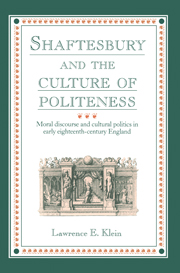 Shaftesbury and the Culture of Politeness
Shaftesbury and the Culture of Politeness Book contents
- Frontmatter
- Contents
- Acknowledgments
- Bibliographical note
- Introduction
- Part I Polite Philosophy
- 1 The amalgamation of philosophy and breeding
- 2 Lord Ashley's Inquiry. The philosophy of sociability and its context
- 3 The notebooks: the problem of the self
- 4 The notebooks: philosophy in the inner life
- 5 Philosophy in society
- 6 Philosophical writing
- Part II Polite Whiggism
- Index
2 - Lord Ashley's Inquiry. The philosophy of sociability and its context
Published online by Cambridge University Press: 13 March 2010
- Frontmatter
- Contents
- Acknowledgments
- Bibliographical note
- Introduction
- Part I Polite Philosophy
- 1 The amalgamation of philosophy and breeding
- 2 Lord Ashley's Inquiry. The philosophy of sociability and its context
- 3 The notebooks: the problem of the self
- 4 The notebooks: philosophy in the inner life
- 5 Philosophy in society
- 6 Philosophical writing
- Part II Polite Whiggism
- Index
Summary
Seriousness
Shaftesbury's first serious attempt to actuate his philosophical vocation was An Inquiry Concerning Virtue. He wrote it in the later 1690s and, though he seems not to have intended immediate publication, it appeared when John Toland, a member of his circle, had it published in 1699. Much later, the fourth earl of Shaftesbury said that the third earl had objected to the publication and bought up all the copies. But, as A. B. Worden has pointed out, Shaftesbury seems to have cooperated in the translation of the treatise into French by Pierre Desmaizeaux (1673–1745), Huguenot émigré and free-lance man of letters in the international intellectual scene.
Moreover, Shaftesbury included a revised version of the Inquiry in Characteristicks and assigned it a strategic importance. Here one must remember that the early editions of Characteristicks had three volumes: the first containing “A Letter Concerning Enthusiasm,” Sensus Communis, and “Soliloquy”; the second, the Inquiry and “The Moralists”; and the third, “Miscellaneous Reflections.” According to Shaftesbury, the heart of the endeavor was the second volume. He called the first volume “preparatory” to the second and distinguished the critical task of the first volume from the constructive task of the second. Whereas in the first volume he deployed “his sapping Method and unravelling Humour” and assumed a “sceptical Mein,” in the second volume, particularly in the Inquiry, he “discovers himself openly, as a plain Dogmatist, a Formalist, and Man of Method” In the Inquiry, not only did he plainly assert his philosophical positions, but he also adopted the method and style of formal philosophy, “dry Reasonings.”
- Type
- Chapter
- Information
- Shaftesbury and the Culture of PolitenessMoral Discourse and Cultural Politics in Early Eighteenth-Century England, pp. 48 - 69Publisher: Cambridge University PressPrint publication year: 1994


